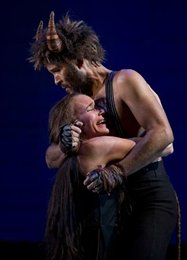“I just got bored with the 'well-made play' – beginning, middle, and end, you know? We’re all kind of bored of it.” So said playwright Marina Carr on why her latest work, Phaedra Backwards, is set in “Now and Then. Then and Now. Always.” Premiering in the McCarter Theatre Center at Princeton University, New Jersey, Phaedra Backwards deliberately mangles the past with the present, life with the afterlife, and humanity with the monstrous. This cross-breed is the playwright’s attempt to offer a more complex (and complicated) perspective on the eponymous queen. However, the result is somewhat scatter-shot.
 We begin at the finish, as Phaedra (Stephanie Roth Haberle) and Theseus (Randall Newsome) face each other after the news that Theseus’ son Hippolytus (Jake Silbermann) has “gone over the cliff.” (Jumped? Fallen? It is kept deliberately vague.) Rachel Hauck’s set design evokes the sense that the characters are standing on a precipice: the front rows of the McCarter Matthews Theatre were removed to allow room for a stone floor that juts out like a cliff-face. Against the cyclorama backdrop, transparent plastic rectangles hang in labyrinthine pattern. A battered dining room table (that will gradually pile up with empty champagne bottles) and a chaise longue complete the sense that these two live in a world suspended in uncertainty between the ancient and the modern. As the stunned Theseus demands to know whether it is true that Phaedra slept with his son, Phaedra attacks him with a scathing “You bring something that beautiful into my house and expect me to just look?”
We begin at the finish, as Phaedra (Stephanie Roth Haberle) and Theseus (Randall Newsome) face each other after the news that Theseus’ son Hippolytus (Jake Silbermann) has “gone over the cliff.” (Jumped? Fallen? It is kept deliberately vague.) Rachel Hauck’s set design evokes the sense that the characters are standing on a precipice: the front rows of the McCarter Matthews Theatre were removed to allow room for a stone floor that juts out like a cliff-face. Against the cyclorama backdrop, transparent plastic rectangles hang in labyrinthine pattern. A battered dining room table (that will gradually pile up with empty champagne bottles) and a chaise longue complete the sense that these two live in a world suspended in uncertainty between the ancient and the modern. As the stunned Theseus demands to know whether it is true that Phaedra slept with his son, Phaedra attacks him with a scathing “You bring something that beautiful into my house and expect me to just look?”
Phaedra’s lethal lust for her stepson has found purchase in the minds of playwrights for millennia. Euripides, Seneca, and Racine have all mined the ancient Greek myth to each create their own portrait of a queen caught in the machinations of the goddess of love, who inflicts Phaedra with unquenchable (and unrequited) desire for Hippolytus. But this Phaedra is no pawn of the gods. “A few thousand years ago we could blame Aphrodite,” Phaedra opines grandly, “…Now I have to take the blame for everything myself. That’s the one thing I really cannot abide about being modern.” Carr deliberately inverts the power structures and gender relations to create her latest Greek gothic, following on from earlier works like Ariel and By The Bog Of Cats.
Euripides’ Hippolytus spewed virulent misogyny as he rejected his stepmother’s affections: here, Jake Silbermann plays a callow boy mooning after Phaedra with impotent yearning. Racine portrayed Theseus as lusty warrior: Randall Newsome plays him more like a quietly self-satisfied executive, smug in priapic pride. In myth, Phaedra is helplessly tormented by her passion for Hippolytus: in this incarnation, she is a ruthless manipulator, using her feckless stepson’s affections first as a lure to try and goad her husband into a reaction, and then as a ruse to save her own skin. Phaedra’s fatal flaw is not lust: it is cowardice. For her audacity in marrying Theseus – her dead sister’s lover; the man who killed her brother, the Minotaur – the ghosts of Phaedra’s ill-fated family are calling in old blood debts.
 The Minotaur is the fulcrum on which this re-imagining of the Phaedra myth rests. Play and production invest heavily in opening up the myth of the man-monster. We see his origins, as Queen Pasiphae (Angel Desai) squirms with lust to the lowing of the famous white bull that she has been smitten with a bestial desire for. (The production also offers the queasily memorable image of the queen squatting ignobly inside a fake cow like a beast in estrus). We see the child Minotaur, an impossibly adorable horned urchin in a nightgown romping innocently with his sisters, Phaedra and Ariadne. But we also see the deadly beast he will become, as the shade of the Minotaur (Julio Monge) haunts Phaedra, reminding her of innocence lost and debts owed. (An impression somewhat spoiled by the fact that his costume bears an unfortunate resemblance to Mr Tumnus, the Narnian faun.)
The Minotaur is the fulcrum on which this re-imagining of the Phaedra myth rests. Play and production invest heavily in opening up the myth of the man-monster. We see his origins, as Queen Pasiphae (Angel Desai) squirms with lust to the lowing of the famous white bull that she has been smitten with a bestial desire for. (The production also offers the queasily memorable image of the queen squatting ignobly inside a fake cow like a beast in estrus). We see the child Minotaur, an impossibly adorable horned urchin in a nightgown romping innocently with his sisters, Phaedra and Ariadne. But we also see the deadly beast he will become, as the shade of the Minotaur (Julio Monge) haunts Phaedra, reminding her of innocence lost and debts owed. (An impression somewhat spoiled by the fact that his costume bears an unfortunate resemblance to Mr Tumnus, the Narnian faun.)
Ultimately, however, for a story steeped in lust and violence, this production ends up being disappointingly bloodless, both literally and figuratively. Every punch is pulled, each invective half-hearted. In a scene where Phaedra is being tortured by her ghoulish family, she thrashes mutely like a fish on a line in a pantomime of impotent horror while they mime at her with blunt knives. Seneca’s description of Hippolytus’ mauled body is a verbally violent masterpiece of visceral description; here, the matinee idol good looks are flawless in death save a symbolic bloodied mark upon his chiselled face. But the real loss in this production is that at no point does the characters’ desire to make a mark on those they love pulse with real passion. Combined with a script whose fractured structure weakens the potential for empathy, the end result is unfocussed and emotionally disconnected. At one point, Phaedra bemoans her loss of innocence: “The distance travelled from myself is too great.” Ultimately, the production too seems to have lost its way from the play’s mythic core of lust and guilt.
Tanya Dean is a dramaturg and scholar, currently studying for her doctorate in Dramaturgy and Dramatic Criticism at Yale School of Drama.